
Thursday night was the Polk County Relay For Life Kickoff. There was a good group of supporters who came out to the Union Bank Community Room who came out to get the 2009 Polk County Relay For Life started. There was pizza donated by Simple Simon's and lots of Relay giveaways for those who came out. 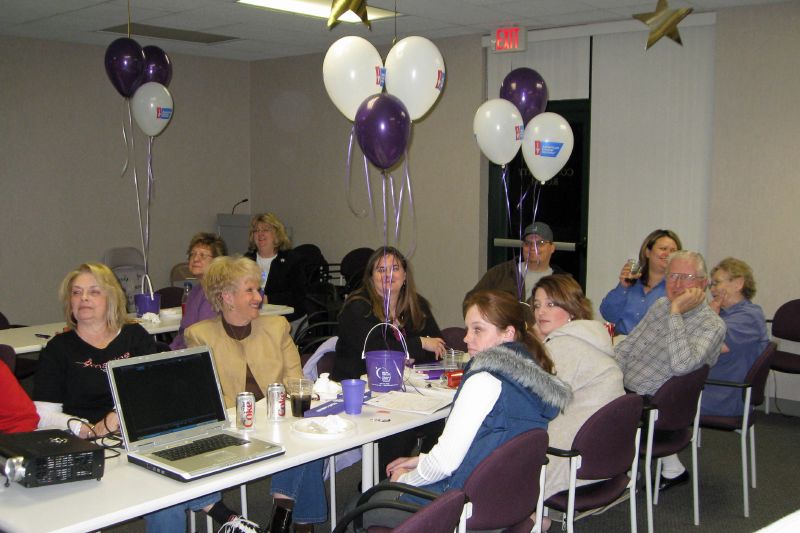
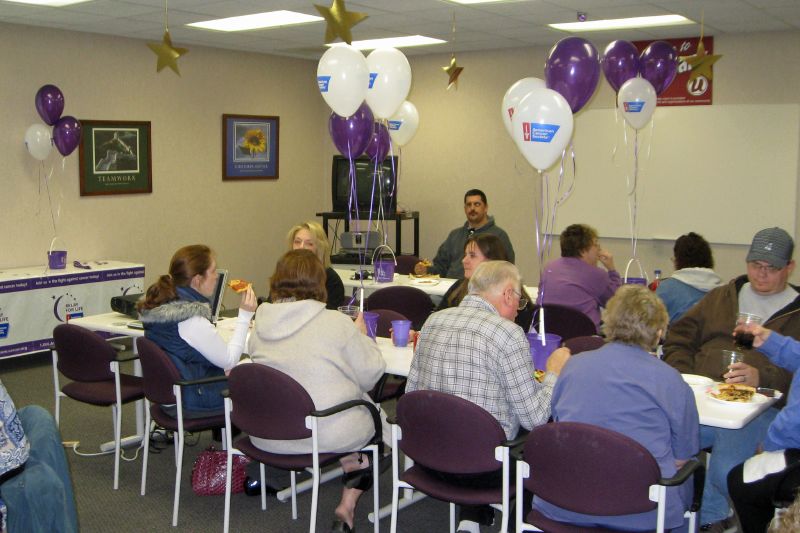
The Relay is off to a good start with 10 teams already signed up. Our goal is to have 24 teams this year. I am confidant that we will be able to reach our goal. 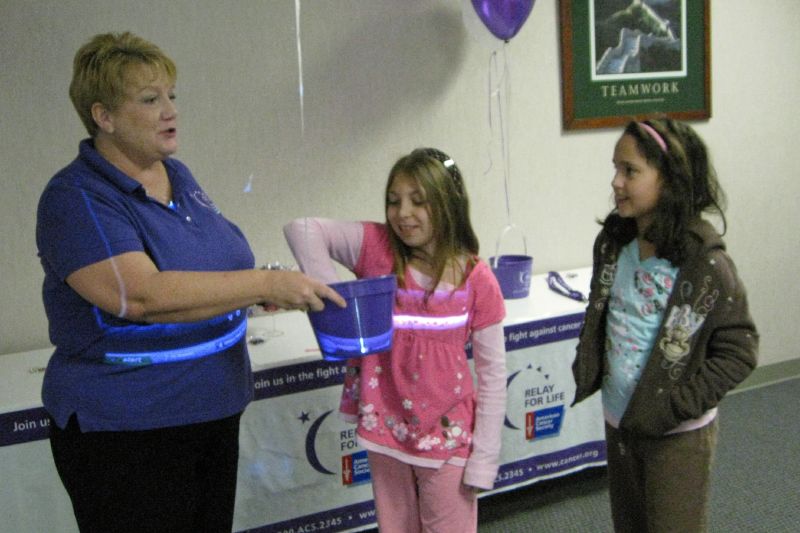
GIVING OUT DOOR PRIZES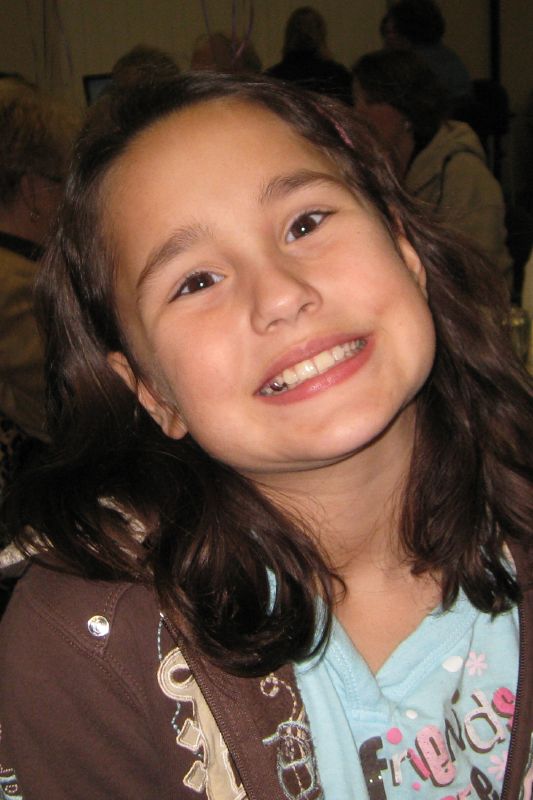
RELAY MAKES ME SMILE
You can keep up with our progress on the Polk County Relay For Life Website.
Saturday, January 31, 2009
Kickoff
Posted by Richard Lawry at 3:35 PM 1 comments
Friday, January 30, 2009
Citizen Of The Week

In the January 28 issue of the Polk County Pulse my wife Regina was featured as the Citizen of the Week. The article was titled "Regina Lawry - Running the Relay For Life". Michael Reisig was the writer. Here is the article as he wrote it.
Regina Lawry of Mena is a person on a mission. She is committed to The American Cancer Society's "Relay For Life" - the organization's number one fundraiser for cancer victims around the country. In a terrible irony, everyone in her immediate family has suffered with cancer - her mother, her father and all three of her sisters. She has taken it personally, and Lawry now does everything she can to combat this dreaded disease, ease the suffering of those who are dealing with it, and inform the public about the parameters of health and prevention.
POLK COUNTY RELAY FOR LIFE CHAIRMAN
Lawry was born in Denver, Colorado. Her father was a tile setter and her mother was a housewife, but it was her grandmother who died when Lawry was only six, that left a lasting impression on her. 
GINA'S FAMILY AND THE HOUSE SHE GREW UP IN
"My grandmother wold take me to church - she was part of The Dorcas society, which made quilts, collected clothes and did other kindnesses for people who needed assistance in whatever fashion," she said. "I realized somewhere along the line, from her example, I wanted to be a person who did things for other people - the way a Christian should be."
Lawry graduated high school and went on to Union College in Nebraska. She graduated in 1975 and married her husband Richard that summer. She became an accountant and her husband became an auto body repair professional.
"After our daughter was born we realized that we were working so much and not able to spend the time together as a family," she recalled. "So we decided to visit Mena where Richard's family lived. We left Denver in February with below zero temperatures and arrived in Mena in 70 degree weather. It seemed like a real nice change...After visiting we decided to move to Polk County if our house in Colorado would sell. It sold two weeks later, and on Easter Sunday of 1981 we settled into country life.
GINA CYNDA AND I IN ARKANSAS
"It was a huge transition for me - a city girl - but after awhile I realized I had never felt like I belonged anywhere until I moved here," Lawry added. "It has proven to be a very good thing.
In 1976, just after she and her husband were married, Lawry's mother died of Leukemia. Her father later contracted colon cancer and all three of her sisters have battled breast cancer, so the struggle against this disease has become very personal. But she has seen the value of research and cures.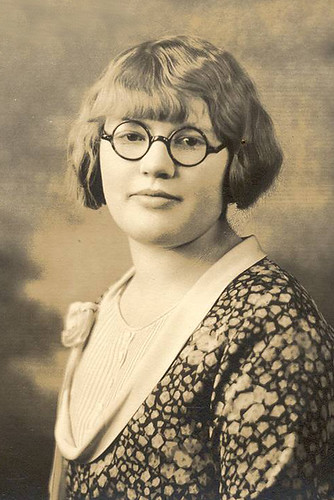
GINA'S MOTHER AT AGE 16
"My mother, while suffering with Leukemia, was a part of a study on bone marrow transplants at the University of Colorado Medical Center,' she recalled. "Twenty years later, my oldest sister received a bone marrow transplant that saved her life, from the same hospital. In 2000 I became involved in the Relay For Life benefit run. The Relay for Life benefits every kind of cancer research and is continually in the process of saving lives and providing money for research, information on cancer, and support in many fashions, including temporary housing for commuters to hospitals, transportatin costs, education, wigs, hats and a lot more.
I run the Credit Union at U.S. Motors in Mena but this - The Relay - is what I do, who I am." she continued. "I am just a little person from a country town, but I wanted to do something to help my children and my grandchildren remember me the way I remember my grandmother - serving other people."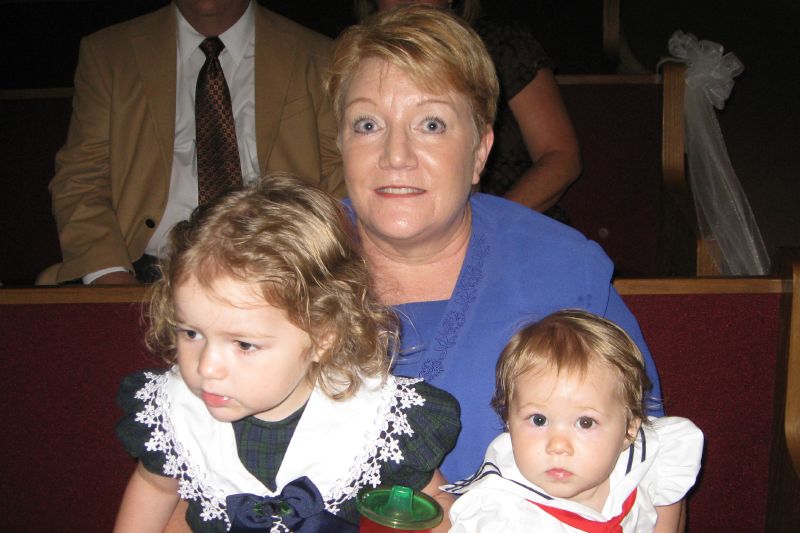
GINA WITH HER GRAND-DAUGHTERS
Lawry attend every "Relay" she can and the latest, closest to home, will be in Mena on April 17 and 18 in Janssen Park.
"We want everyone to participate this year," Lawry said. "We need committee members, teams, and team members. The 'kickoff" is Thursday, January 29, at the Union Bank Hospitality Room. There will be free pizza, door prizes, and all the information you need on starting a team for families, churches, clubs, and employees of businesses. Last year we had 22 teams and raised $58,000. This year our goal is 24 teams and $64,000. There is hardly anyone who hasn't been touched by cancer in some fashion, and we need to take this seriously. Come join us in the Relay For Life."
Posted by Richard Lawry at 7:38 PM 0 comments
Labels: citizen mena
Wednesday, January 28, 2009
Fighting Back
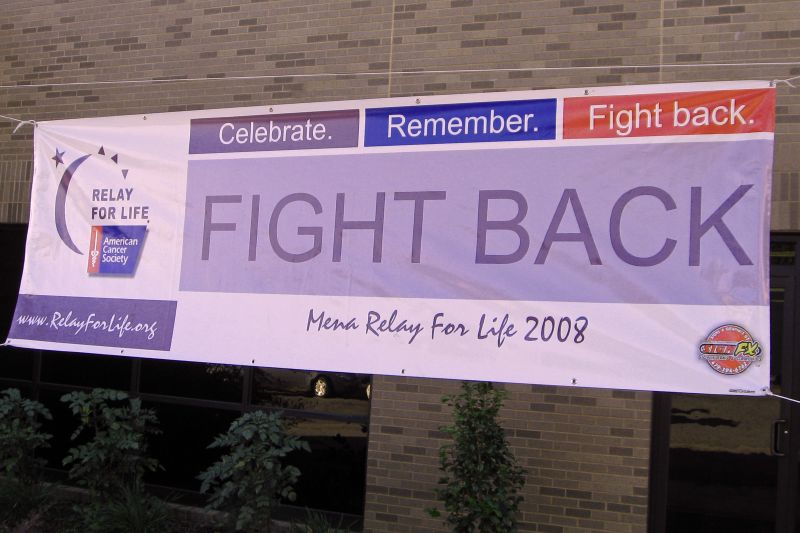
Relay For Life participants have been instrumental in helping the American Cancer Society make progress against cancer and save lives. A recent report from the nation’s leading cancer organizations shows that, for the first time since the report was first issued in 1998, both incidence and death rates for all cancers combined are decreasing for both men and women.
"The drop in incidence seen in this year's Annual Report is something we've been waiting to see for a long time," said Otis W. Brawley, MD, chief medical officer of the American Cancer Society (ACS). "However, we have to be somewhat cautious about how we interpret it, because changes in incidence can be caused not only by reductions in risk factors for cancer, but also by changes in screening practices. Regardless, the continuing drop in mortality is evidence once again of real progress made against cancer, reflecting real gains in prevention, early detection, and treatment."
Posted by Richard Lawry at 7:21 AM 1 comments
Sunday, January 25, 2009
Where Does The Money Go?

Since the inception of its Research Program in 1946, The American Cancer Society has contributed to almost every major cancer discovery. As a result of research advances, there are more than 10 million cancer survivors in America.
• American Cancer Society funding of select researchers led to effective treatments like chemotherapy, radiation, and bone marrow transplants that extend thousands of lives each year.
• Many cancers such as breast, cervical, colon and prostate can be detected early when treatment is more effective. Society-funded research has led to the development of early detection methods such as the PSA test and mammography.
• If colon cancer is discovered and treated early, the 5-year relative survival rate is 90%.The Society has been a leader in raising awareness about the importance of getting tested for colon cancer to save lives.
• Original American Cancer Society scientific research contributed to the recognized link between smoking and lung cancer. The Society is helping smokers double their chances of quitting through our Quitline, 1-877-YES-QUIT.
• The American Cancer Society advocates for stronger smoking ordinances and state laws to protect employees and the public from tobacco smoke in an effort to reduce death and illness caused by smoke.
• The American Cancer Society works to fund researchers early in their careers, when funding is particularly hard to receive. Remarkably, 38 of those funded researchers have gone on to win the Noble prize.
• Any time, day or night, people facing cancer can connect with lifesaving information, resources, and support online at www.cancer.org or through our toll-free call center – 1-800-ACS-2345.
• You are never alone in the Cancer Survivors NetworkSM, an online community that connects patients, survivors, and caregivers with others who have “been there” for insight, moral support, and inspiration.
• When the best hope for a cure is at a cancer center far from home, Hope Lodge® provides a comfortable, nurturing environment where patients and caregivers can stay free of charge during treatment and focus on what is most important – getting well.
• Through I Can Cope® classes, medical professionals help patients and their families overcome fears through information and resources to understand their cancer experience.
• Patients need not worry about how to get to and from their treatments when trained American Cancer Society volunteers offer free transportation, friendship, and support through our Road to Recovery® program.
• A free consultation with a Look Good … Feel Better® beauty consultant helps female patients feel beautiful again by providing tools and tips to overcome treatment side effects and restore their pre-cancer appearance and self-esteem.
• The American Cancer Society offers many other programs, services, and resources to help with the cancer journey. Call the Society to find out which ones are right for you, 1-800-ACS-2345.
• Ensured access to breast and cervical cancer screenings for low-income women.
• Passed the Patient Navigator Act, which allows for personal navigators who will assist patients in medically underserved communities gain access to affordable, understandable prevention, detection, and treatment services.
• New Medicare enrollees now have access to a “welcome visit” with their physician that will result in personalized healthy lifestyle and screening recommendations.
• Cancer advocates sent over 45,000 letters to Congress urging them to support cancer research and programs.
• Continuing to restrict youth access to tobacco.
• Reduced deaths and illnesses by advocating for stronger smoking ordinances and state laws to protect employees and the public from tobacco smoke.
Posted by Richard Lawry at 7:32 PM 2 comments
Thursday, January 22, 2009
Martial Arts Cancer Survivor

Michael Veltri has been teaching aikido in Washington, DC for 8 years, as the Chief instructor of Okinawa Aikikai, U.S. Dojos. He first began studying this Japanese martial art while stationed with the U.S. Marine Corps in southern California. Fluent in Japanese, he then trained in Japan for 10 years.
The physical and mental conditioning he developed during the course of all that training served him well when he faced his greatest challenge, cancer.
Says Veltri, "Marine Corps boot camp was physically tough, but where most people would crack would be mentally. It's the same thing in the martial arts. You have to have that mental discipline. And that's what helped me during all aspects of my recovery, my treatment, and even now."
'I'd Never Been Sick'
It was April 2003 when Veltri noticed a lump on his right testicle. "It wasn't large. It wasn't painful. It just wasn't right. It felt hard and I waited about a week to see if I pulled something in training."
When the lump didn't disappear, Veltri made an appointment to see a urologist, who ordered a blood test and CAT scan. The blood test confirmed a testicular tumor. Fortunately the CAT scan showed no spread of the cancer to the rest of his body.
The diagnosis came as a surprise. "I'm very attuned to my body," Veltri says. "I have a very healthy lifestyle. I'd never been sick a day in my life before I got cancer."
Surgery was immediately scheduled for the next day to remove the testicle. Then he had monthly CAT scans as part of the follow-up. In July, the scan revealed that the testicular cancer had spread to his left lung.
A Difficult Course of Treatment
Radiation was not a good option for Veltri's type of tumor, so from July through October, he underwent intense chemotherapy treatments.
Since his doctors couldn't be completely sure whether the shrunken tumors contained any live cancer cells, they recommended surgery to remove them. At the beginning of November 2003, Veltri had half of his left lung removed and spent the next 2 months recovering from the invasive and debilitating procedure.
"You're talking to a guy who's a professional athlete, and then I was stuck in wheelchair," he says. "You had to learn to reuse your entire body all over again. You had to learn how to use your lungs again. It was a very painful procedure."
By the end of December, Veltri was able to take his first jog and was busy getting his body back on track. He was checked every 3 months for the first 2 years. Now he has CAT scans once a year, sees his oncologist every 6 months for blood tests. He just passed his 5th anniversary of completing treatment in November.
His Road to Recovery
Since 2004, Veltri has volunteered with ACS's Road to Recovery, driving cancer patients to and from chemotherapy and radiation appointments. Most of the patients had never had a cancer survivor drive them, he says, so that was a positive bonding experience.
Each spring he also volunteers for Daffodil Days, one of the American Cancer Society's oldest programs to raise funds and awareness to help beat the disease.
"I wanted to give back," he says. "I've always been a service-oriented person – whether that was serving my country in the Marine Corps or serving the community by teaching martial arts."
Veltri enjoys connecting with other cancer survivors through his volunteer work and teaching aikido. "If people have never gone through it, it's hard to relate," he says. "Talking to other cancer patients was very therapeutic for me."
He credits a strong network with helping him through the recovery process. "I couldn't do it by myself," he says. "I relied heavily on family and friends."
Attitude Is the Key
He also relied on his martial arts training. Dealing with the uncertainty of waiting for test results can be debilitating – if you let it be, says Veltri.
"Aikido teaches us to blend with your situation," he says. "You're not going to beat it up. You're not going to try to be stronger than it or faster than it. Instead of worrying, you just try to find a way of living in harmony with it, instead of trying to fight it."
Knowledge is power, says Veltri. He read Lance Armstrong's book, It's Not About the Bike: My Journey Back to Life, and did other research on his disease.
For Veltri, the key to survival is your mindset. "Attitude is so, so important," he says. "There were some very dark days going through chemotherapy. Everything is failing. You can't eat. You feel miserable. You have no energy. And you've got to be able mentally, emotionally and spiritually to get through that."
Posted by Richard Lawry at 6:26 PM 0 comments
Monday, January 19, 2009
Why I Relay

I am involved in Relay For Life for a number of reasons. The number one reason is because my wife is passionate about Relay. She has such a passion for Relay For Life that it rubs off on those around her. Her passion stems from her family history. Her mother died of cancer when Gina was just 21 years old. Her father had colon cancer, and all three of her sisters have had breast cancer. She is the only person in her immediate family that is cancer free.
JIM "BIG BEAR" HUFF AND REGINA LAWRY
2008 POLK COUNTY RELAY FOR LIFE
Several years ago, Gina's sister Roberta got involved with Relay For Life in Enumclaw, Washington. For a number of years, Gina would travel to Enumclaw to be a part of Relay For Life there. Two years ago, we learned that Polk County was going to have a Relay. We got involved in the 2007 Relay, and have been involved ever since.
My uncle, Delbert Lawry, died from cancer a couple of years ago. I lost not only an uncle, but a friend and someone who was willing to help anytime. I have come to realize the importance of the work that the American Cancer Society does. It is involved in research, prevention, and helping those who are dealing with cancer.
Just about everyone has been affected by cancer in one way or another. Relay For Life is a fun way to raise money and awareness for the American Cancer Society. There is probably no other cause that a person can support that touches more lives. Relay celebrates those who have battled cancer, it remembers those who have fallen, and it provides a way to fight back. That is why I am proud to be a part of Relay For Life. I hope that you will be a part of Relay For Life too.
Posted by Richard Lawry at 1:52 PM 2 comments
Labels: family cancer relay for life
Friday, January 16, 2009
Committee Meeting

2008 POLK COUNTY RELAY FOR LIFE COMMITTEE
Today the Polk County Relay For Life Committee held it's first meeting of the new year. We had 18 people at the meeting. What a blessing it was for so many people to be willing to volunteer for such an important cause. Last year the Relay was put on by a Committee of just 7 hard working people. Even though the committee was small, the Relay was very successful. We raised over 60,000 dollars.
The first order of business was planning for the Kickoff. The kickoff party will be held at 6:00 P.M. Thursday, January 29th at The Union Bank. We hope for a large group to get things started. There will be pizza and refreshments served and door prizes. We are looking forward to seeing everyone at the Kickoff.
Posted by Richard Lawry at 6:01 PM 0 comments
Thursday, January 15, 2009
Childhood Cancer

The types of cancers that occur in children vary greatly from those seen in adults. Leukemias, brain and other nervous system tumors, lymphomas (lymph tissue cancers), bone cancers, soft tissue sarcomas, kidney cancers, eye cancers, and adrenal gland cancers are the most common cancers of children.
Leukemias are the most common childhood cancers. They account for about 33% of all childhood cancers.
Although there are exceptions, childhood cancers tend to respond better to chemotherapy. Children also tolerate chemotherapy better than adults. But, because chemotherapy can have some long-term side effects, children who survive their cancer need careful attention for the rest of their lives.
About 10,730 children under the age of 15 in the United States were expected to be diagnosed with cancer in 2008. Because of significant advances in treatment, 80% of these children will survive 5 years or more. This is a major increase from before the 1970s, when the 5-year survival rate was less than 50%.
Posted by Richard Lawry at 8:57 AM 0 comments
Monday, January 12, 2009
Signed up for Relay 2009

I have signed up for the 2009 Polk County Relay For Life. The Relay will be held in April at Janssen Park in Mena. We are just getting started with the organization of the event. You can go to the event webpage here. My personal Relay For Life Webpage is here.
Posted by Richard Lawry at 1:08 PM 0 comments




